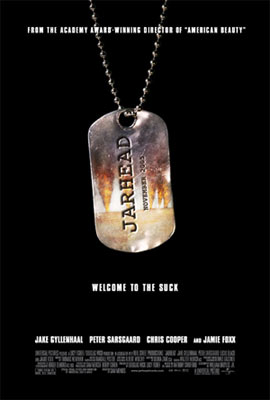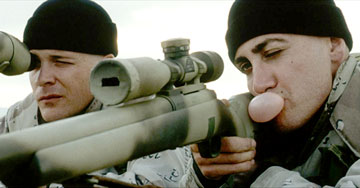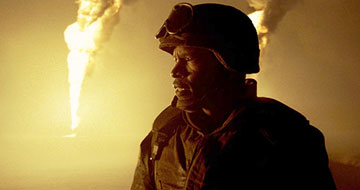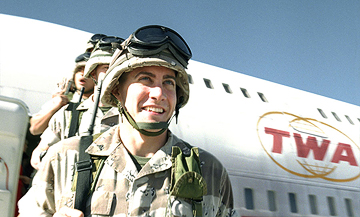Jarhead

 When we first meet Anthony (played by Jake Gyllenhaal), he is already regretting his decision of joining the Marines. After all, he has a beautiful girlfriend back home, and now here he is being screamed at by drill sergeants, and being abused by his fellow soldiers because he's the "fresh meat" of the group. He is soon set off to Boot Camp to be trained as a sniper by the no-nonsense Staff Sergeant Sykes (Jamie Foxx), who loves his job in the military, and makes this fact clear numerous times. Anthony does not exactly share Sykes' enthusiasm, but he quickly makes his way through training, and earns his place among his fellow men including his mentor Troy (Peter Sarsgaard from Flightplan) and the rowdy Kruger (Lucas Black from Friday Night Lights). With the impending Gulf War on the horizon, Anthony and his fellow squad members find themselves shipped out to the desert to fight their great war.
When we first meet Anthony (played by Jake Gyllenhaal), he is already regretting his decision of joining the Marines. After all, he has a beautiful girlfriend back home, and now here he is being screamed at by drill sergeants, and being abused by his fellow soldiers because he's the "fresh meat" of the group. He is soon set off to Boot Camp to be trained as a sniper by the no-nonsense Staff Sergeant Sykes (Jamie Foxx), who loves his job in the military, and makes this fact clear numerous times. Anthony does not exactly share Sykes' enthusiasm, but he quickly makes his way through training, and earns his place among his fellow men including his mentor Troy (Peter Sarsgaard from Flightplan) and the rowdy Kruger (Lucas Black from Friday Night Lights). With the impending Gulf War on the horizon, Anthony and his fellow squad members find themselves shipped out to the desert to fight their great war.They arrive to a rousing speech set by Lt. Col. Kazinski (Chris Cooper) that immediately puts the men into fighting spirit. They are trained, they are pumped, and they are ready. However, as the days slowly tick by with no action, the soldiers quickly find morale dropping. They can see glimpses of a war being fought off in the distance, but they are stuck making their way across the desert on foot. All they have to do to pass the time is drinking, arguing amongst each other, and writing letters to home, wondering if the women they left behind are still faithful. The movie slowly ticks off the days that pass by, and we see the mounting frustration and anguish in the eyes of Anthony and his fellow men. These soldiers have been trained and pumped for action, and yet, the world is passing them by. Instead of the heat of battle, they must endure only the heat of the desert sun. They must force smiles for cameras and news crews, and tell them it's an honor to be serving their country, although in reality, they would rather be anywhere but where they are. They have been promised glory, and all they find is a strange land they do not understand, and a war that they don't even get to participate in. What is Anthony to do when he returns to civilian society? Here he is with all this knowledge but nothing to do with it. After all, as he states, whether he holds it or not, his rifle will always be a part of his body for the rest of his life.

Jarhead is a leisurely-paced, yet fascinating character study that shows what happens when someone buys into patriotism and morale, and finds that the reality is something a lot more different and mundane than what he has been promised. Anthony has heard war stories from his dad and his uncle. As a matter of fact, he was even born from a war, as his parents had sex while his father was on leave from his Vietnam duty. When Anthony's squad starts hearing talk of unrest in Iraq, they become excited. This is finally their time to write their own war stories that they will pass on to others. They arrive to find a very different war from what they've been promised. One where they can only watch the destruction. They make their way through charred areas, and can see fire and smoke off in the distance. That is not their war. They are here to simply protect the oil fields. The war seems to be over almost as soon as it begins. Why are they even here, and what are they to do now?
 The frustration these men feel is expressed in different ways, either lashing out at each other, or at themselves. There is a scene late in the film where Anthony is on the verge of finally seeing some action. He has a clear shot at an enemy soldier in a tower. Just as he has been given the orders to fire, however, his chance is taken away from him. His shot may give away an incoming air strike by another division of the military. His one chance to see any sort of action, and it is stolen from him. It is also his only shot, as when he returns to his men, he finds them celebrating the end of the war, and that they are going home. He has been denied everything he was trained to do, and now he must return to civilian life, and be forced to suppress and forget everything he has devoted the past few years of his life to. America welcomes him home a hero, but it is a hollow victory, because to Anthony and his squad, there never was a victory or even a defeat.
The frustration these men feel is expressed in different ways, either lashing out at each other, or at themselves. There is a scene late in the film where Anthony is on the verge of finally seeing some action. He has a clear shot at an enemy soldier in a tower. Just as he has been given the orders to fire, however, his chance is taken away from him. His shot may give away an incoming air strike by another division of the military. His one chance to see any sort of action, and it is stolen from him. It is also his only shot, as when he returns to his men, he finds them celebrating the end of the war, and that they are going home. He has been denied everything he was trained to do, and now he must return to civilian life, and be forced to suppress and forget everything he has devoted the past few years of his life to. America welcomes him home a hero, but it is a hollow victory, because to Anthony and his squad, there never was a victory or even a defeat.The soldiers in Jarhead are not the glorified boys of World War II, or the tormented souls of Vietnam. They are confused, angry, and anxious to put their skills to use. Jake Gyllenhaal provides a certain vulnerability and confusion that the lead role requires. While he idly wastes his days away in 100+ degree heat, waiting for something to happen, he worries that the life he left behind won't be there when he gets back. He receives troubling letters from his girlfriend back at home that she may have moved on. As he makes his way through the desert, he can only torture himself with thoughts of what she may be doing and who she may be doing it with. His fellow soldiers are all in similar situations. At their base camp, they have a "Wall of Shame" where they hang up photos of girlfriends who have been unfaithful to them since leaving for war, and openly ridicule them. There are some moments of joy (one of the soldiers learns he has become a father), but even these fleeting instances seem small when you are stuck in a place you don't understand. All of the actors do an excellent job with their respective roles, and their growing anger. Peter Sarsgaard, in particular, has an emotional scene near the end when he finally breaks down after he's been refused the chance to actually do what he's been trained to do. Many of the men have similar moments when they just cannot handle the monotony of the desert anymore, and each sequence is heartbreaking and real.

Director Sam Mendes uses his environment well, creating some unforgettable images. A scene where the soldiers come across a series of charred cars, each containing charred bodies, is appropriately chilling. They get a first-hand look at the cruelty that they are supposed to be fighting against, but they feel they can do nothing about it, even though they are supposed to be able to. His directing style in Jarhead is intentionally leisurely, fitting the mood and atmosphere. The film has an appropriately sun-baked look to it, almost as if the film has been exposed to the sun too long in certain scenes. Using primarily yellows, oranges, and blacks to paint his grim picture, Mendes allows us to share the same feelings of isolation and loneliness that his characters feel.
The idea of a war film that does not feature soldiers fighting may indeed sound anticlimactic, but Jarhead works because it is a realistic portrayal of a soldier discovering that his skills really have no use in the war that he is participating in. He has no place, and he knows it. The entire cast create characters that may not always be sympathetic (many of the men are young, rowdy, and out of control), but are always real. I commend director Sam Mendes and screenwriter William Broyles, Jr (The Polar Express) for taking a difficult concept, and making it into one of the more highly entertaining dramas I've seen so far this year.
See the movie times in your area or buy the DVD at Amazon.com!






0 Comments:
Post a Comment
<< Home